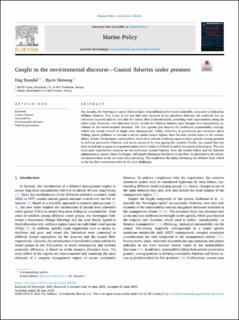Caught in the environmental discourse—Coastal fisheries under pressure
| dc.contributor.author | Standal, Dag | |
| dc.contributor.author | Hersoug, Bjørn | |
| dc.date.accessioned | 2022-10-28T13:52:48Z | |
| dc.date.available | 2022-10-28T13:52:48Z | |
| dc.date.created | 2022-09-15T14:18:24Z | |
| dc.date.issued | 2022 | |
| dc.identifier.citation | Marine Policy. 2022, 143 1-10. | en_US |
| dc.identifier.issn | 0308-597X | |
| dc.identifier.uri | https://hdl.handle.net/11250/3028929 | |
| dc.description.abstract | For decades, the Norwegian coastal fisheries have been defined as the most sustainable, compared to industrial, offshore fisheries. This is due to the low fuel costs involved in the nearshore fisheries, the relatively low investments required and the fact that the coastal fleet is decentralized, providing work opportunities along the entire coast. However, over time new actors, outside the fisheries domain, have brought new sustainability attributes to the environmental discourse. The new agenda goes beyond the traditional sustainability concept, which was closely related to single stock management. Today, reduction of greenhouse gas emissions, ghost fishing, plastic pollution at sea and a stricter quota control regime, have become central topics in the sustainability debate. Furthermore, sustainability labels from private certifying agencies have gained a strong position in defining sustainable fisheries, and hence, access to the best paying fish markets. Finally, the coastal fleet has been locked into a quota management regime which makes it difficult to utilize new green technologies. The new order puts considerable pressure on the traditional coastal fisheries. How the coastal fishers and the fisheries administration answer these challenges, will largely determine the future of this fleet. As described in the article, the answers have so far not been very convincing. This could turn the tables, favouring the offshore fleet, which so far has been more responsive to the new challenges. | en_US |
| dc.language.iso | eng | en_US |
| dc.publisher | Elsevier | en_US |
| dc.rights | Navngivelse 4.0 Internasjonal | * |
| dc.rights.uri | http://creativecommons.org/licenses/by/4.0/deed.no | * |
| dc.subject | Fisheries governance | en_US |
| dc.subject | Environmental discourse | en_US |
| dc.subject | Sustainability | en_US |
| dc.subject | Coastal fisheries | en_US |
| dc.title | Caught in the environmental discourse—Coastal fisheries under pressure | en_US |
| dc.title.alternative | Caught in the environmental discourse—Coastal fisheries under pressure | en_US |
| dc.type | Peer reviewed | en_US |
| dc.type | Journal article | en_US |
| dc.description.version | publishedVersion | en_US |
| dc.rights.holder | © 2022 The Authors. Published by Elsevier Ltd. | en_US |
| dc.source.pagenumber | 1-10 | en_US |
| dc.source.volume | 143 | en_US |
| dc.source.journal | Marine Policy | en_US |
| dc.identifier.doi | 10.1016/j.marpol.2022.105183 | |
| dc.identifier.cristin | 2052100 | |
| dc.relation.project | Norges forskningsråd: 320822 | en_US |
| dc.source.articlenumber | 105183 | en_US |
| cristin.ispublished | true | |
| cristin.fulltext | original | |
| cristin.qualitycode | 1 |
Tilhørende fil(er)
Denne innførselen finnes i følgende samling(er)
-
Publikasjoner fra CRIStin - SINTEF Ocean [1345]
-
SINTEF Ocean [1417]

